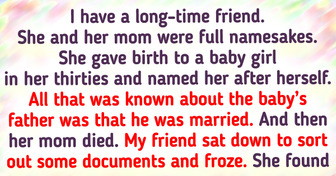I Thought I Was Helping With the Bills—The Truth Shattered Me

Older siblings in many families usually have exceptional intellect and talents. Take Alec Baldwin, Francis Edward Bache, and even the famous Dr. Spock, as perfect examples. Scientists suggest that our birth order and the birth order of our children has a lot to do with our intelligence and other abilities!
Bright Side is always an advocate of knowledge, especially when it comes to better understanding our shortcomings and talents. Here is an article that will captivate your attention, even if you are not an older sibling yourself.
In the year 2017, research at the University of Edinburgh revealed the studies of IQ tests among same-parent siblings that showed that due to the mental stimulation from parents, older siblings show higher levels of thinking skills. When the siblings were tested on emotional development, however, there were almost no differences.
Researchers followed over 5,000 siblings, from birth to 14 years old. Every two years these kids were IQ-tested in a variety of ways and older siblings were shown to perform better at each subsequent age.
According to Meri Wellace, birth order has a tremendous impact on firstborns, those born second and middle children. While firstborns are more intellectually developed, they can struggle with the parental pressure to be perfect. Kids born second are usually prone to having less attention from parents when it comes to their achievements — so they thrive on approval. And middle children often feel lonely and “squeezed out,” so parents have to make sure that they spend enough time with them.
With their first child, parents often want to succeed both emotionally and intellectually, almost like they are running some sort of race to raise the perfect kid. Combine that with a lack of knowledge about actually raising a human being and in the end you will have a child that is bombarded with the attention and drive of their parents, to make something of themselves. That is why firstborns are usually pushed to succeed and develop intellectually.
After the firstborn becomes “one of the kids” and not just the only child in a family, it can affect them in a way that makes them mature faster. Since the child’s mother is preoccupied with a newborn, sometimes the first child feels left out and gains their parents’ approval by helping them take care of their younger sibling. This leads to these children taking over parental responsibilities at a very young age, and this status is usually supported by the family. This is often why the oldest child becomes smarter and really mature for their age.
Since academic and intellectual success is directly affected by parental attention and affection, we have to acknowledge that kids who lack in parental interaction and who lack in time spent with their parents show lower abilities, especially when it comes to learning and IQ.
If we know the flaws in our parenting skills that occur subconsciously, we can predict the outcome. But more so, we can implement this knowledge in our everyday parenting scenarios. We can start by not over pressuring our oldest ones and splitting attention evenly between our children. Also, open conversations and trust, along with the authority of parental knowledge, will help you maintain thriving relationships and create a solid foundation for your kids to step up from childhood into adulthood.
What special traits do you see in your siblings or children? Does your everyday life support the findings of these scientists? Be sure to share your thoughts with us in the comments!











